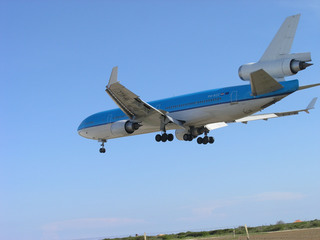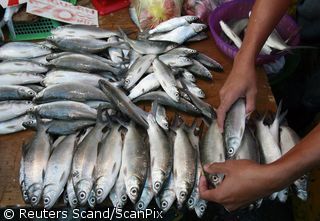Sweden Thrives on Exports One Year After Voters Reject the Euro
Published:
16 September 2004 y., Thursday
A year after Swedish Prime Minister Goeran Persson told voters his country needed the euro to compete in world markets, the Swedish economy has done a good job of proving him wrong.
The National Institute of Economic Research in Stockholm last month raised its economic growth forecast to 3.5 percent this year and 3 percent in 2005. A global expansion has boosted demand for Swedish exports while worker productivity has increased faster than in the 12 countries sharing the euro, which 56 percent of Swedish voters rejected on Sept. 14, 2003.
Swedish and international companies are betting on Sweden. Last month, for example, Atlet AB said it would close its forklift plant in Oberhausen, Germany, and move about 30 jobs to its factory in Moelnlycke, Sweden. Second-quarter foreign direct investment in Sweden jumped to a net 19.9 billion kronor ($2.7 billion), after a year-earlier outflow of 31.4 billion kronor.
The European Central Bank expects the economy of the euro region to expand about 1.9 percent this year and 2.3 percent in 2005. By one study, Sweden ranks second in the world in productivity.
Sweden, a nation of 9 million people that joined the European Union in 1994, accounts for 2 percent of the bloc's population and 2.7 percent of economic production. Its economy has grown faster than that of the euro region for eight of the past 10 years.
Šaltinis:
Bloomberg
Copying, publishing, announcing any information from the News.lt portal without written permission of News.lt editorial office is prohibited.
The most popular articles
 The European Commission has today decided to close the formal investigation procedure into the agreement between Bratislava Airport in Slovakia and Ryanair after concluding that the airport operator acted as a market economy investor and therefore no advantage has been granted to Ryanair.
more »
The European Commission has today decided to close the formal investigation procedure into the agreement between Bratislava Airport in Slovakia and Ryanair after concluding that the airport operator acted as a market economy investor and therefore no advantage has been granted to Ryanair.
more »
 The coffee industry of Jamaica represents one the largest earners of foreign exchange, approximately US$30 million in 2008.
more »
The coffee industry of Jamaica represents one the largest earners of foreign exchange, approximately US$30 million in 2008.
more »
 On January 13, 2010, the Executive Board of the International Monetary Fund (IMF) concluded the Article IV consultation with Mauritius.
more »
On January 13, 2010, the Executive Board of the International Monetary Fund (IMF) concluded the Article IV consultation with Mauritius.
more »
 The World Bank's International Development Association and the International Monetary Fund have agreed to support US$1.6 billion in debt relief for the Islamic Republic of Afghanistan.
more »
The World Bank's International Development Association and the International Monetary Fund have agreed to support US$1.6 billion in debt relief for the Islamic Republic of Afghanistan.
more »
 The Common Agricultural Policy plays a critical role in helping farmers to deliver environmental goods and services, provided that policies are targeted in the right way.
more »
The Common Agricultural Policy plays a critical role in helping farmers to deliver environmental goods and services, provided that policies are targeted in the right way.
more »
 Regional Policy Commissioner Paweł Samecki will meet Croatia's Prime Minister Jadranka Kosor and members of her government in Zagreb on 25-26 January to discuss the country's preparations for accession in the context of the EU cohesion policy.
more »
Regional Policy Commissioner Paweł Samecki will meet Croatia's Prime Minister Jadranka Kosor and members of her government in Zagreb on 25-26 January to discuss the country's preparations for accession in the context of the EU cohesion policy.
more »
 The World Bank Board of Directors today approved US$20 million for the Dominican Republic in support of the Municipal Development Project, which aims to improve the technical and financial capacity of local governments.
more »
The World Bank Board of Directors today approved US$20 million for the Dominican Republic in support of the Municipal Development Project, which aims to improve the technical and financial capacity of local governments.
more »
 The European Investment Bank (EIB) is lending EUR 400 million to Ford Romania SA for the expansion and refurbishment of the company’s existing car assembly plant located in Craiova in the South-West of Romania.
more »
The European Investment Bank (EIB) is lending EUR 400 million to Ford Romania SA for the expansion and refurbishment of the company’s existing car assembly plant located in Craiova in the South-West of Romania.
more »
 The Agriculture Council of the European Union has examined ways to improve the functioning of the food supply chain with the ultimate aim of controlling the fluctuation in prices and ensuring a more equitative distribution of the added value throughout the chain.
more »
The Agriculture Council of the European Union has examined ways to improve the functioning of the food supply chain with the ultimate aim of controlling the fluctuation in prices and ensuring a more equitative distribution of the added value throughout the chain.
more »
 The European Commission has today approved an application from Lithuania for assistance under the Globalisation Adjustment Fund (EGF).
more »
The European Commission has today approved an application from Lithuania for assistance under the Globalisation Adjustment Fund (EGF).
more »